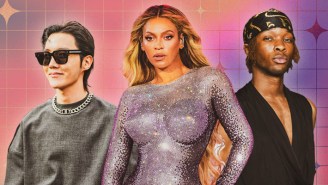Filled with equal doses of ignorance and curiosity about the game of golf, yesterday I tuned in to catch the final, crucial holes of the Ryder Cup.
And while my No. 1 fear didn’t come to pass – that circumstances would lead to Tiger Woods taking the lion’s share of the blame for the U.S. team’s epic collapse – I was bothered by what surfaced (or more accurately, didn’t surface) during a post-tournament interview with Jim Furyk, the U.S. golfer who lost a key one-on-one match to Europe’s Sergio Garcia.
“I’m pretty sure Sergio would tell you that I outplayed him today,” a dejected Furyk told reporters. “But I didn’t win and I lost the match.”
Read that again. Understand it. Now read it one more time, only this time switch Furyk’s voice with the voice of, say, LeBron James. Or Dwight Howard, or Kobe Bryant, or Kevin Garnett. Now imagine the social and national media reaction afterward had one of those NBA superstars made a statement similar to Furyk’s.
Can you outplay someone and still lose? Maybe that’s common in golf. I’ll admit I don’t know much about the game. But I do know a double standard when I see one.
In the hours since Furyk’s interview, I’ve yet to see a prominent sportswriter or popular Twitter hound trashing the accomplished veteran. I haven’t seen any fan or expert calling Furyk out as a sore loser, a crybaby, a punk, or just a delusional choke artist grasping at straws.
In fact, reading through a sampling of six Ryder Cup columns prominently featured on ESPN, CBS Sports and Yahoo! on Sunday, I noted Furyk was taken to task in all six for his gut-wrenching loss to Garcia. But only two of those columns included the quote in which Furyk claims he outplayed Garcia, and only one of those addressed the quote beyond a simple mention. In one column that focused primarily on Furyk, the writer not only omitted the quote, he suggested instead that Furyk’s biggest problem this weekend was “wanting it too much.”
Now try this: Imagine the Miami Heat blowing a 2-0 playoff series lead and being eliminated in six, then in the aftermath LeBron says, “I’m pretty sure the Celtics would tell you that we outplayed them, but we didn’t win.”
How long would it take Twitter and the news wires to light up with a deluge of criticism? How long and hot would that fire burn?
It wouldn’t even have to be a polarizing figure like LeBron. Throw Rajon Rondo or Tristan Thompson in the same scenario. Make it Joe Johnson or DeMar DeRozan. Make it Dwight or Kobe or KG. Trust me, it wouldn’t be much different.
I realize that I could overreacting. I could be making too many assumptions. But I doubt it.
Just as well, there could be many innocent reasons why Furyk isn’t at the center of a media firestorm this morning. Maybe it’s because a large chunk of writers and TV talking heads simply missed the quote. Maybe it’s because the Ryder Cup had already been buried under the NFL’s Week 4 action by Sunday night. Maybe it’s just easier to talk about popular golfers like Tiger, Rory McIlroy and Bubba Watson than to focus on an understated guy like Furyk.
But it seems clear to me that this is another example of one group of athletes being treated differently than another group of athletes would be treated in the same situation.
More specifically, it reminds me of the collective media and social bias against basketball that is rooted in dynamics of race and class that are part of our sad American tradition.
Why are basketball players subject to much sharper criticism than golfers?
Why have basketball players sparked widespread debates and major rule changes concerning when they should be allowed to turn professional, when teenage tennis players and young hockey phenoms and budding soccer stars have not?
Why are basketball players called thugs when they throw punches during a game, but hockey players are called tough guys for the same actions?
Why are basketball players called unsportsmanlike if they decline to shake hands with an opponent after a big game or playoff series, but baseball players have a tradition of only shaking hands with their own teammates that never draws a negative word?
Why do basketball players populate so many “Most overpaid” sports lists, when there are NCAA coaches and MLB players who pull in just as many millions of dollars without physically working as hard?
Why are basketball players the go-to subjects for so many “athlete gone broke” stories, when there are just as many (if not more) broke soccer players and NASCAR drivers?
Why was the U.S. men’s basketball team held to a standard where anything less than a blowout at the London Olympics was touted as a sign of weakness, but the U.S. women’s soccer team simply had to win matches in order to win the hearts of America? And why was anything less than a gold medal considered a failure for the Dream Team, but certain divers and distance runners and gymnasts were celebrated as champions even if they earned silver or bronze?
Before you write this off as a misguided play of the “race card,” really think about those questions. It’s not just a series of isolated incidents with no connection.
I don’t think it’s far-fetched to say the answers to those questions have a lot to do with the fact that basketball – at its highest level down to its playground roots – is considered a “Black sport” played by millions of Black men. (Football is basketball’s closest competitor in this regard, and in many ways I could have written this same piece on Cam Newton or Terrell Owens, but most other sports aren’t so closely associated to a particular race.)
Consciously or not, too many professional journalists and social media mavens alike in this country seem to have an easier time criticizing, belittling, underestimating, underrating, mocking and disrespecting Black athletes. And in related news, our society in general has centuries of history of doing the same to Black people in general.
While athletes of all races enjoy many advantages and blessings, it doesn’t mean they aren’t touched by American racism and prejudice. Black athletes may be rich, famous and gifted with talents most men desire, but they’re not always allowed to play on a level field.
LeBron James knows this. Tiger Woods knows this. And maybe even Jim Furyk knows this. But, as is the benefit of his White privilege, it appears this week he won’t have to suffer for it.
Is there a double standard?
Follow Austin on Twitter at @AustinBurton206.
Follow Dime on Twitter at @DimeMag.
Become a fan of Dime Magazine on Facebook HERE.






